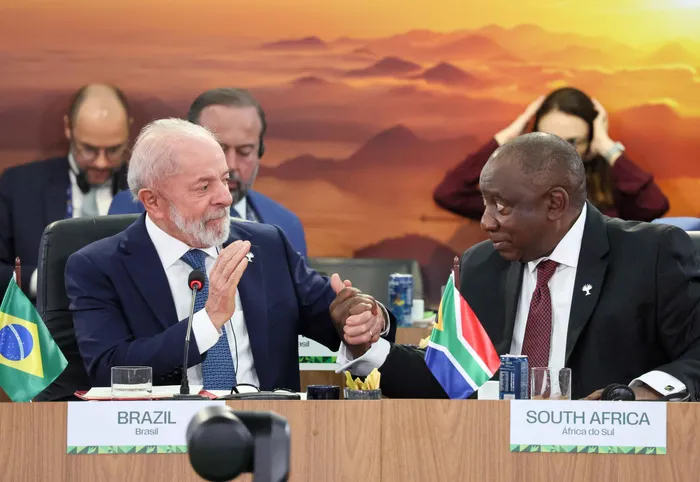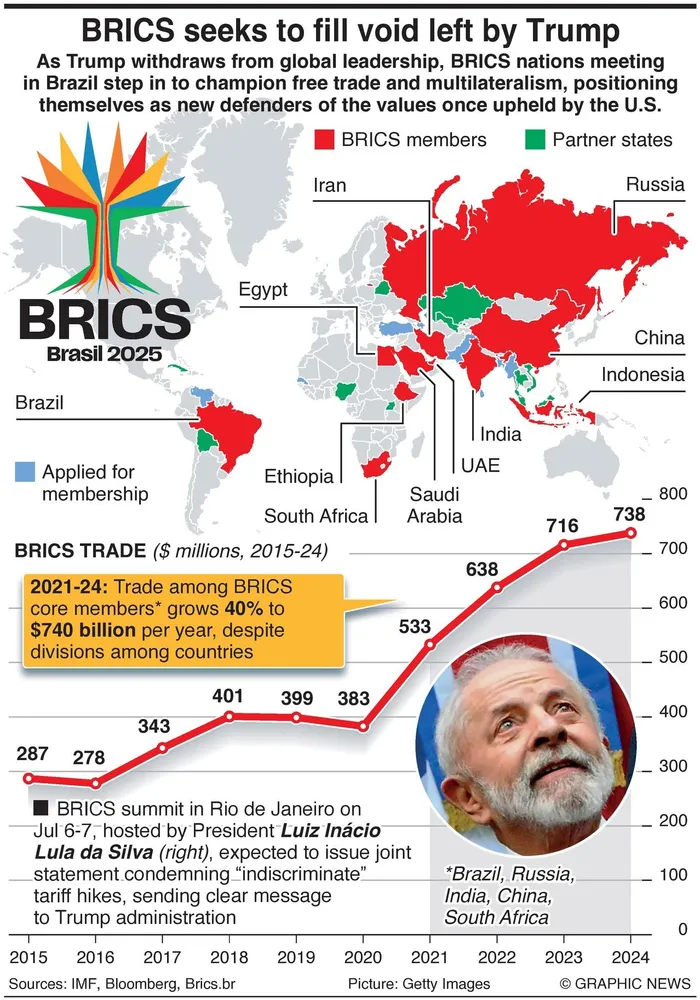BRICS countries unite to blunt Trump's bullying

Brazil President Luiz Inácio Lula da Silva and South Africa's President Cyril Ramaphosa in discussion at the XVII BRICS Summit held on July 07, 2025, in Rio de Janeiro, Brazil.
Image: GCIS
Kim Heller
BRICS is a rising superpower. With an enviable geopolitical footprint across Africa, the Middle East, and Asia, the BRICS countries collectively account for over 45% of global GDP.
The 17th BRICS Summit, held in Rio de Janeiro this week, showcased the bloc's immense potential and steady growth. The Rio Declaration, adopted at the summit, sets out a compelling vision for a more equitable global economic matrix.
The summit paraded BRICS as an ardent king-in-waiting in a royal quest for a global economic renaissance. It appears as if BRICS is shaping up, despite its internal economic and ideological asymmetries. There was an atmosphere of confidence and prowess at the summit, accompanied by a greater measure of strategic cohesion than in previous summits.
The President of Brazil, President Luiz Inácio Lula da Silva, spoke of BRICS as a “set of countries that want to find another way of organising the world from the economic perspective." The President of Brazil declared, "The world has changed. We don't want an emperor."
Echoing this sentiment, Vladimir Putin, the President of Russia, who joined the meeting remotely, stated, "Everything indicates that the model of liberal globalisation is becoming obsolete. The centre of business activity is shifting towards the emerging markets."
The architecture of today's global financial world is engineered to favour the Global North. According to the World Bank, the Global South accounted for 40% of global trade in 2024; however, its average tariffs of 6.5% were significantly higher than the 2.5% average for developed economies.
The United States and the European Union continue to rule over the IMF and World Bank, while G7 countries dictate the global economic agenda.Determined to shift inequalities and imbalances in the world's economic matrix and recalibrate global monetary policy, the BRICS summit focused on reducing reliance on the U.S. dollar and stimulating local currencies, trade, and investment.
This includes a ten billion U.S. dollar investment platform via the New Development Bank to drive, incentivise, and boost trade and infrastructural development within and across BRICS nations. Multilateral guarantees will help reduce financing costs. To achieve more equitable monetary policies, practices, and participation, BRICS reiterated its call for stronger representation on the United Nations Security Council and for IMF quota reforms to be implemented by the end of the year.

Trade statistics of BRICS countries.
Image: Graphic News
The Rio de Janeiro Declaration reiterated the need for developed nations to fulfil their climate change obligations. China and the UAE committed to supporting Brazil's "Tropical Forests Forever" initiative.South Africa's President, Cyril Ramaphosa, described BRICS as a platform for sovereign economic coordination free from geopolitical coercion.
But U.S. President Donald Trump wasted no time in threatening countries that aligned with "anti-American BRICS policies" with an additional 10% tariff. He has stated that BRICS was created to destroy the U.S. dollar. Several BRICS leaders have retaliated, condemning the weaponisation of tariffs.
Mao Ning, a spokesperson for the Chinese Foreign Ministry, stated that the arbitrary increase in tariffs does not serve anyone. He spoke of the dollar's domination as more than just an economic issue. "It is a 'geopolitical chokehold."
Speaking out against Trump's new tariff warning, President Ramaphosa said, "There needs to be greater appreciation of the emergence of various centres of power in the world, as the declaration observed, and this should be seen in a positive light rather than in a negative light."
Ramaphosa also stated that "These powers should be seen as complementary, as advancing the interests of people.”
Donald Trump cannot conceive of a world where the dollar is not the gold standard. But a new world is waiting to be born. It may not be tomorrow, but it is in the making. Reflecting on the BRICS Summit, President Narendra Modi of India spoke about how the moment reaffirmed the commitment to shared growth.
He said, "The Global South isn't begging for fairness, it's demanding it. The economic order's bias is a relic, and BRICS is ready to rewrite the rules.”
The re-engineering of power relations is vital for BRICS, as U.S. dollar dependence creates and reinforces economic power inequalities and imbalances, keeping the Global South hooked on a global order that treats it as a junior partner.
However, for now, BRICS is no match for the U.S.
With many of its member states highly dependent on U.S. markets and trade, de-dollarisation has little currency for now. It is unlikely that countries such as India and Brazil, as well as newcomers Saudi Arabia and the UAE, will compromise their economic relations with the U.S. in the short to medium term.
The U.S. dollar is King for now. There will be small, gradual wins for BRICS. Already, the lion's share of Russia's trade with BRICS partners is dollar-free. China is currently using BRICS Pay, albeit on a small-scale, pilot basis.
However, with low currency swaps and conversions, and poor equity, the grand plans for a shared BRICS currency and a SWIFT alternative are remote. This may change over time. De-dollarisation will need to be correctly paced, especially given the vastly different relations member states have with the U.S.
The process of de-dollarisation and the overhaul of the global economic system is likely to be slow and laboured and distinctly uneven across different member states, economic sectors, and industries. Trump's distasteful bully boy tactics will eventually wear thin, and U.S. relations will falter.
The bloc's challenge is to keep its diverse assembly of member states united around a common vision of a world where the Global South will be the leading player in world economic affairs. BRICS needs to play the long game.
* Kim Heller is a political analyst and author of No White Lies: Black Politics and White Power in South Africa.
** The views expressed do not necessarily reflect the views of IOL, Independent Media or The African.